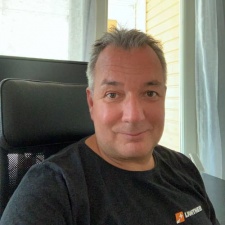There's no doubting that hyper-casual publisher Voodoo's knowledge and expertise has played a big part in its success, but if it didn't have games to publish, it wouldn't have achieved such great heights.
Following on from our chat with the publisher on its approach to game development and publishing, we spoke to some of its partner studios to find out more about the development process and what Voodoo provides to the people it works with.
This time around, we spoke to Mark Cochrane, CEO of Finnish studio Lightneer, about working with Voodoo and creating successful games.
PocketGamer.biz: How did your company first get started?
Mark Cochrane: Lightneer was founded in September 2015 by Rovio execs: Niklas Hed, Lauri Kontorri, Peter Vesterbacka and Lauri Jarvilehto.
The original mission was to try to use casual games as vehicles for teaching complex subjects to children. Unfortunately this did not work out, and the newly appointed CEO, Mark Cochrane, pivoted the company into hyper-casual in September 2018.
Lightneer is based in the heart of Helsinki and is a collection of studios under one roof. The company is VC backed.
What drew you to developing hypercasual games?
As a learning games studio, Lightneer took two and a half years to create its first game Big Bang Legends. The metrics for this game were not going to sustain commercial success and the product strategy was not scalable. So we decided we needed to do something else.
The company had a lot of prototyping experience - founder Lauri Konttori ran Rovio's prototyping unit LVL11 for 4+ years. So we saw the potential for creating games very fast and testing them to see if they would be interesting for players and have a data driven, fast iterate-or-kill approach.
We also saw the explosion in the hyper-casual category and so there was an alignment of strategy, competence, and market.
How did your partnership with Voodoo first begin?
We had advisors like Alex Willink (ex-Gram Games) who has a wealth of hyper-casual experience talking to us early on in our pivot.
We really like that Lightneer and Voodoo are very aligned on the need to test as frequently as makes sense, both in early concept validation and in soft and global launch phases.Mark Cochrane
After multiple self-publishing failures and the coincidence of Alex joining Voodoo as General Manager of Berlin's hyper-casual studio, we decided to see if working with a super experienced publisher on some games would accelerate our learnings and help us get our first hit faster. We started working together in April 2019 and slowly but surely deepened our relationship.
What support has Voodoo offered when it comes to developing your games?
Voodoo has been a great partner for us in terms of helping us decide on concepts that are right for the market, suggesting general directions to take our games in to improve the marketability or retention and helping with the creatives process in the scaling phase. It is great to have a publisher with the experience of success in the category 'having your back'.
How has Voodoo helped grow your business overall?
Voodoo has been very supportive of us as a studio from the get-go and helped us create our first hit Good Slice, which has now has over 18 million downloads and is a significant contributor to Lightneer's revenue.
Voodoo understands it is not easy to create hyper-casual hits and have stuck with us through several failures. They see potential in us to create multiple hits, which I am delighted to say we are now realizing. We definitely would not have got where we are today as fast as we have without their help.
What do you think is the key to making a successful hypercasual game?
Making successful hyper-casual games is not easy. To maximise your chances of success you really need to immerse yourself in the market, benchmark your ideas, you need to know why people play hyper casual games and what the player is looking for in terms of experience.
You need to create a fresh, innovative, super satisfying core and you need to make it super simple for anyone to understand how to play by watching a three-second video. Easy, right?
How important is testing to ensuring your game will be a success?
It's important to ensure that once you have a prototype that the team is happy with that you test early and often, so don't hold it back and polish. Market validation is super important to ensure that the product market fit is there, players are interested in your game, and that it delivers a fun, engaging experience.
We really like that Lightneer and Voodoo are very aligned on the need to test as frequently as makes sense, both in early concept validation and in soft and global launch phases.
What the studio might think is right for them may well not be right for the audience and so testing is essential to confirm or deny hypotheses around updates to the game.
What are your goals as a developer for the next 12 months?
Lightneer is looking to expand its capabilities as a studio over the next 12 months, and grow to around 12 teams over the next 12 months both in Helsinki and other locations worldwide.
Our goal is to release another three to four hits in that timeframe. We are always looking for top talent or indie studios with a passion for the hyper-casual category to join our team/community.






















